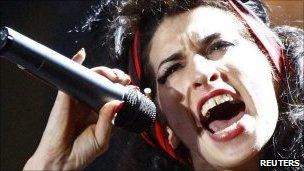Amy Winehouse: To boo or not to boo?
- Published

Singer Amy Winehouse has been booed by an audience after appearing to be drunk. When is it acceptable to express one's disapproval this way?
All it takes is one audience member to start it, and enough disgruntled spectators around them who are prepared to join in. Then, like an orchestra's crescendo, that primal rumble of disapproval starts to build.
It's a noise every performer dreads, but every regular attendee of live music, comedy and, especially, sport will be familiar with the sound of booing.
Amy Winehouse is the latest high-profile figure to suffer this fate after she was booed by a crowd in the Serbian capital Belgrade after appearing to be too drunk to perform.
One can leave aside whether this audience were right to anticipate that a performance by Amy Winehouse should be a spectacle of monastic dedication and sobriety. Their reaction was a display of a crowd's most simple and effective method of communication.
Sometimes, of course, boo-ees are vindicated by history. Those who booed Bob Dylan for going electric at the Newport Folk festival and subsequently cried "Judas!" at Manchester's Free Trade Hall receive little sympathy from most latter-day rock critics.
And no less a voice of sagacity than England captain John Terry said the sound of Welsh fans drowning out God Save the Queen inspired his team to take an early two-goal lead during an international match at the Millennium Stadium in March.
Most public figures, however, will not welcome booing with the magnanimity of John Terry.
Indeed, his team-mate Wayne Rooney was roundly condemned for his angry reaction after England were booed by their own supporters after drawing with Algeria during the 2010 World Cup.
For this reason, Neil McCormick, the Daily Telegraph's chief rock music critic, regards booing as a uniquely democratic practice.
Too often, he believes, rich and cosseted performers, accustomed to adulation, take for granted those who pay their wages by taking to the stage late, or refusing to play familiar material.
In this context, McCormick argues, to boo is to offer a timely corrective.
"A lot of artists get so used to approval, a little bit of booing keeps them on their toes," he says.
"Often the booing is when they come on late and I think that's absolutely right. I just hope the boos permeate backstage so they can hear it."
Critics may regard booing as symptomatic of a society in which good manners have been degraded but, in fact, the practice can be traced back to ancient Greece.
The first written record of an audience vocally expressing its disapproval come from the Festival of Dionysus in the 6th Century BC, when the Athenian noble and democratic reformer Cleisthenes insisted it was the civic duty of every citizen not just to applaud good plays, but to whistle bad ones.
The Romans, too, saw jeering as an intrinsic component of public spectacle. In gladiatorial competitions, the reaction of the crowd could determine life or death, the Latin word explodere meaning "to drive off stage by clapping".
The verb "to boo", however, is more recent, dating back to the 19th Century. Since then, the practice has become familiar in the UK, along with the slow handclap, though European crowds may prefer to vent their disapproval by whistling.
Comedian Jenny Eclair cheerfully recalls being heckled offstage regularly as she built her career.
She argues that booing Winehouse was unfair - the crowd's ire, Eclair insists, should have been reserved for those who allowed the troubled singer to take the stage in the first place.
But she acknowledges that a chorus of boos can, in fact, come as a relief to a performer if it hastens their exit from a disastrous performance.
"There's something very final about being booed off," she says. "The decision has been made. You have to go.
"There should be more booing in shops and restaurants and places like that when when the service is bad. If you've had a poor breakfast in a hotel, you should put your knife and fork down and boo."
It's a suggestion of which Cleisthenes would surely approve.